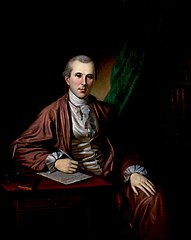Dr. Benjamin Rush’s “Travels Through Life” Digitized
Here’s another source on the Revolution recently digitized: eight handwritten volumes of Dr. Benjamin Rush’s “Travels Through Life: or Account of Sundry Incidents and Events in the Life of Benjamin Rush…written for the use of his children.”
The American Philosophical Society in Philadelphia owns these volumes and has made them perusable over the web.
There’s a ninth and final volume nearby at the Library Company of Philadelphia.
George W. Corner transcribed and edited Rush’s memoir for publication by the A.P.S. in 1948, which was late for the first-person reminiscences of a noted Founder. The Autobiography of Benjamin Rush is still under copyright, therefore, and I haven’t come across any digitized edition on the web.
As a result, some of Rush’s anecdotes aren’t as well known and retold as one might expect. Here from near the start of handwritten volume 6, for example, is the doctor’s recollection of interactions with George Washington on 18 June 1775, right after he agreed to be the Continental Congress’s top general:
The American Philosophical Society in Philadelphia owns these volumes and has made them perusable over the web.
There’s a ninth and final volume nearby at the Library Company of Philadelphia.
George W. Corner transcribed and edited Rush’s memoir for publication by the A.P.S. in 1948, which was late for the first-person reminiscences of a noted Founder. The Autobiography of Benjamin Rush is still under copyright, therefore, and I haven’t come across any digitized edition on the web.
As a result, some of Rush’s anecdotes aren’t as well known and retold as one might expect. Here from near the start of handwritten volume 6, for example, is the doctor’s recollection of interactions with George Washington on 18 June 1775, right after he agreed to be the Continental Congress’s top general:
A few days after the appointment of General Washington to be commander in chief of the American Armies, I was invited by a party of Delegates and several citizens of Philada. to a dinner which was given to him at a tavern on the Banks of the Skuilkill below the city.My transcription differs from Corner’s in tiny details of punctuation and capitalization. But only by looking at the manuscript can we see, for example, that Rush:
Dr. [Benjamin] Franklin, Mr. [Thomas] Jefferson, James Wilson, Jno. Langdon of New Hampshire and about a dozen more, constituted the whole company. The first toast that was given after dinner was “The Commander in chief of the American Armies.” General Washington rose from his seat, and with some confusion thanked the company for the honor they did him. The whole company instantly rose, and drank the toast standing.
This scene so unexpected, was a Solemn one. A silence followed it, as if every heart was penetrated with the awful, but great events which were to follow the Use of the Sword of liberty which had just been put into general Washington’s hands by the unanimous voice of his country.
About this time, I saw Patrick Henry at his lodgings, who told me that general Washington had been with him, and informed him, that he was unequal to the station in which his country had placed him, and then added with tears in his eyes “Remember Mr. Henry what I now tell you,- From the day I enter upon the command of the American armies, I date my fall, & the ruin of my reputation.”
- added the words “New Hampshire” because, I presume, he didn’t think his readers would remember who John Langdon was.
- started to write that Washington thanked his companions with “great confusion” before easing that down to “some confusion.”
- first quoted Henry as saying Washington spoke of “what I this day tell you” and changed that to “what I now tell you,” probably because the phrase “the day” appeared in the next clause.


No comments:
Post a Comment